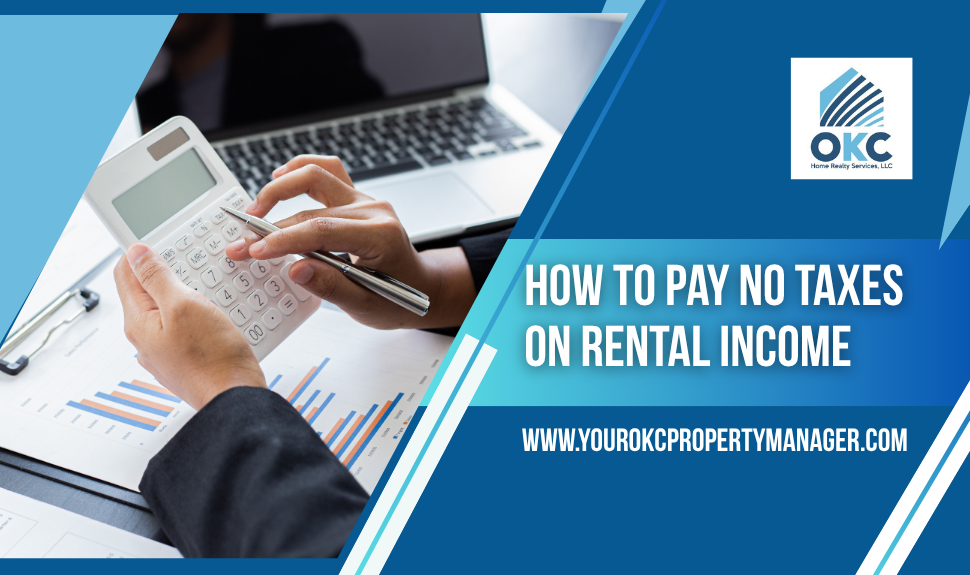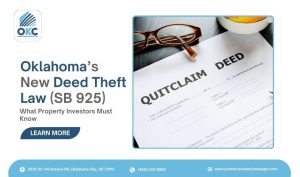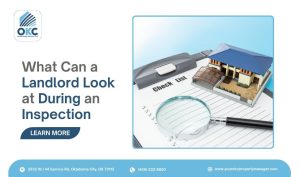Ever wonder if it’s possible to keep every dollar your rental earns instead of handing a big chunk to taxes? For many Oklahoma landlords, it seems too good to be true. But with the right strategies, you can legally minimize,or even eliminate, taxes on rental income while staying fully compliant with federal and state laws.
With over 15 years of experience managing rental properties across Oklahoma City, I’ve seen countless landlords overpay year after year simply because they didn’t know the legal ways to reduce their tax burden.
In this guide, I’ll walk you through everything you need to know about paying little to no taxes on rental income, including practical tips and Oklahoma-specific examples. By the end, you’ll understand how to keep more of your rental income and reduce your tax liability.
Key takeaways on Rental Income Taxes
Before we explore the Ways to Pay Less in Taxes on Your Rental Income, here is a quick overview of what you should know:
- Rental income is taxable, but not all the money you earn is counted as taxable income. For Oklahoma landlords, rental income typically includes:
- Monthly rent, Late fees, and Pet Rent charged to tenants.
- Fees for the services you provided as part of the rental agreement (e.g., laundry fees, parking fees, or storage fees).
- Advance rent payments.
- Not included as taxable income:
- Security deposits returned to tenants.
- If the tenant paid for the repair/improvement on their own and was NOT reimbursed or credited by you, and it was not a substitution for rent, then the landlord generally has no taxable income.
- Depreciation is your key advantage in reducing taxable income, which allows you to deduct the cost of your property over time, significantly lowering taxable income.
- 1031 exchanges can defer capital gains taxes if you reinvest in like-kind properties.
- Oklahoma-specific rules may slightly differ from federal rules, so local knowledge is important.
How to Pay No Taxes on Rental Income Legally?
Here’s the key strategy Oklahoma landlords can use for minimizing liability and legally avoiding rental income tax:
1. Maximize Deductible Expenses
Every legitimate expense related to your rental property reduces your taxable rental income. Here are some common deductible expenses:
- Mortgage Interest: Deduct the interest on loans acquired for the purpose of buying the rental properties or improvements made to your rental property.
- Property Taxes: Deduct your local Oklahoma Property taxes.
- Insurance: Landlord insurance and hazard insurance premiums are fully deductible.
- Repairs and maintenance: Any completed repair and maintenance tasks are deductible expenses, whether fixing a leaky faucet or repainting a unit.
- Property management fees: If you hire a company like Your OKC Property Manager, the management fees are deductible.
Example:
Let’s say your rental property income is $20,000 per year in gross rent. But you spend:
- $4,000 on mortgage interest
- $2,000 on property taxes
- $1,000 on insurance
- $1,500 on repairs
- $1,000 on management fees
- $500 on legal/accounting fees
That equals to $10,000 in deductible expenses, essentially bringing your taxable rental income down to just $10,000.
2. Claim Depreciation for Tax Deduction
Depreciation can be an effective tool; it is applicable to the building only, not the land, so make sure your property records separate land and building costs. The IRS allows you to depreciate your rental property over 27.5 years. Depreciation is simply a paper loss. In other words, you did not spend the money out of pocket, but you are able to write it off regardless.
How Depreciation Works:
If you purchased a rental property for $300,000 and the land is valued at $100,000, you can depreciate the remaining $200,000.
$200,000 / 27.5 years = $7,272
If your net income is $10,000 after other deductions, and you add $7,272 in depreciation, your taxable income drops to just $2,728.
3. Use a 1031 Exchange
A 1031 exchange will allow you to defer capital gains taxes when you sell a rental property if you reinvest in a like-kind or similar property. Example: if you sold a rental in Moore, OK, for $300,000, you should pay capital gain tax, but if you reinvested in a new property, you can defer paying taxes on your capital gains. This strategy doesn’t eliminate the taxes permanently, but it legally postpones them while growing your real estate portfolio.
Rules for a 1031 Exchange:
- Must be like-kind property (the property must be similar in character or nature)
- Must identify the replacement property within 45 days
- Must close on the new property within 180 days
- Must use a qualified intermediary
4. Qualify as a Real Estate Professional
The IRS makes a distinction between passive and non-passive income. Normally, rental income is passive, and losses are limited. However, if you qualify as a real estate professional (spending more than 750 hours per year managing rental properties), your rental losses can offset other income, reducing your overall tax bill.
5. Use Short-Term Rental Strategically
You can legally reduce or even eliminate taxes on rental income through a short-term rental strategy if they are structured correctly.
- 14-day Rule: This rule is also known as the Augusta Rule; the IRS allows property owners to rent their home for up to 14 days per year completely tax-free. If you rent out your property for 14 or fewer days, you don’t need to report that income on your tax return, meaning it’s totally tax-free.
By using these landlord tax strategies, you can reduce or even eliminate taxes on rental income legally.
Additional Tips for Landlords
Regardless of the strategies you use, documentation is important.
- Keep receipts, invoices, and bank statements
- Maintain detailed logs of repairs, improvements, and tenant interactions
- Use property management software to consolidate records
- Track mileage and travel related to rental management
- Consult with a CPA familiar with Oklahoma real estate tax laws
Final Thoughts on How to Pay No Tax on Rental Income
Handling rental income taxes doesn’t have to feel overwhelming. As a landlord, you have several legal property tax deduction strategies. From tracking deductible expenses to leveraging short-term rentals, there are multiple ways to protect your property income while staying fully compliant with IRS and Oklahoma tax laws. The key is to stay organized, document every record, expenses, and work with a professionals who understand both federal and Oklahoma tax laws.
If you’re serious about keeping more of what you earn and optimizing your rental business, consider partnering with a professional property management team. Contact OKC Home Realty Services today and get started on maximizing your profits the smart way.
FAQs on Avoiding Rental Taxes
Does IRS check rental income?
Yes, IRD checks rental income through multiple methods such as tax returns, 1099 forms, payment platforms, and audits. Whether you manage single or multiple rental properties, you should report all rental income with proper documentation of expenses and receipts, which will help defend against any IRS review.
How much tax on rental income?
The tax on rental income depends on different factors. After deducting mortgage interest, property taxes, insurance premiums, repair, and depreciation, your taxable rental income may be lower than your gross rent. In some cases, landlords pay little to no taxes legally.
What is the maximum rental income without tax?
For most situations, there isn’t a maximum rental income without tax. However, under the 14-day rule, landlords can earn up to 14 days of rental income per year tax-free, meaning you don’t report this portion on your tax return.
How does the IRS know if I have rental income?
The IRS can find out about your rental income in several ways, such as third-party reporting( like Airbnb, VRBO), bank records, property records, audits, and cross-checks.

Author
Scott Nachatilo is an investor, property manager and owner of OKC Home Realty Services – one of the best property management companies in Oklahoma City. His mission is to help landlords and real estate investors to manage their property in Oklahoma.
 (
(









